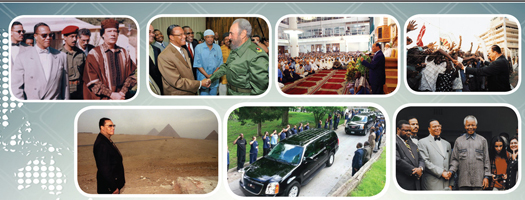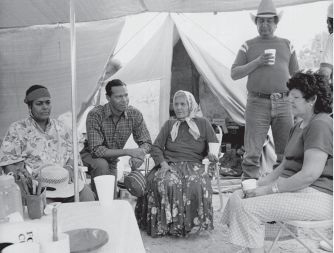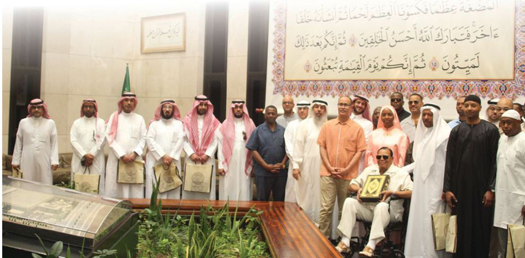
What's your opinion on this article?

|
“Minister Farrakhan is the first African American since El-Hajj Malik el-Shabazz to be received by African and Middle East governments as a defacto head of state.”
Professor Allen’s words came back to my mind recently, and I have thought about them since learning of the Minister Farrakhan’s visit to the Holy Cities of Mecca and Madinah, Saudi Arabia. The Minister and a delegation of extraordinary men and women from the Nation of Islam’s leadership traveled recently to experience the last 10 days of Ramadan as guests of the Saudi King and his government.
It is no secret, that as Black people in America we have routinely had an ambivalent relationship with the office of the president of the United States of America. Our ambivalence began long before the Donald J. Trump administration. In fact, what President Trump displays of crudeness, insensitivity and racist rhetoric is miniscule when weighed against some of his predecessor presidents, 12 of whom actually owned Black people as slaves. There is enough to write an entire book or series of books detailing the infamous record of how the office of the U.S. President has functioned as an evil Pharaoh in the history of Black people in America.
So while the international travels and relationships of the U.S. President are of little interest to “John and Jane Q. Public” of Black America; when we see our entertainers, athletes and leaders travel abroad we are eager to learn all about it.
Minister Farrakhan has a long record of important and significant international activity. His travels and global moves have not been that of a mere tourist. Certainly the Minister has enjoyed visiting the historic sites, but his travels have been in the spirit of and pursuant to the cause of global unity that is powerfully expressed within the teachings of the Most Honorable Elijah Muhammad. The Minister has traveled performing the work of an ambassador, diplomat, conflict resolver and head of state on behalf of Black America.
The Minister, as the most keen and astute student of his master teacher—the Most Hon. Elijah Muhammad—has always drawn inspiration from the seed-like ideas planted in the fertile soil of his mind by his teacher. The Most Honorable Elijah Muhammad loves the human family. And, his basic teachings to his beloved Black community in America is that we should see ourselves as a global people. He has taught us that we are first the brothers and sisters of the Black, Brown, Red and Yellow peoples of the world. And he has taught us that we are even brothers and sisters in faith with Whites who accept and practice Islam. He published a newspaper called Muhammad Speaks and its masthead artwork consisted of the outstretched hands of a Blackman in the Western Hemisphere clasping the outstretched hands of a Blackman in the Eastern Hemisphere. This powerful artistic symbol of the mission of the Nation of Islam colors the work and global travels of our beloved Minister—the Blackman’s president and head of state—the Honorable Minister Louis Farrakhan!

|

|
“Our meeting was able to cover those things that we considered to be fundamental. And there was no issue that arose on which there was disagreement. He has explained his position. His views are identical with the principles that I put forward.”
Minister Farrakhan’s global importance and head of state status is at the heart of what Jude Wanniski concluded about our beloved Minister. Mr. Wanniski was an economist, political strategist and advisor to President Ronald Reagan. He said of the Minister:
“I believe Minister Farrakhan is the most important Muslim leader in the world, who can best represent the concerns of the Islamic world to our government.”
Such an admission from a member of the ruling class of Whites in America is extraordinarily significant. Especially when we consider that it is among the White ruling class that Minister Farrakhan’s most powerful enemies exist. It is also important in light of the fact that currently America is deeply entangled within the conflicts, disputes and destiny of various important Muslim dominated countries. The daily news cycle routinely covers news about developments in Iran, Saudi Arabia, Russia and Israel/Palestine. Minister Farrakhan enjoys strong relationships with various leaders in all these countries. These are all countries that Minister Farrakhan has visited and engaged with their religious, business and political leaders.

|
In the fall of last year, the Minister traveled to Iran for high-level talks with the Iranian government and its Supreme Leader. His visit to the “mother town,” which is the term of endearment used within the Holy Qur’an for the city of Mecca, occurred during this year’s Ramadan observance. Both these Islamic countries have been at odds with one another regarding sectarian religious issues. But recently the Saudi government has become a political ally of Israel, which is a political foe of Iran. The potential for war between these three countries and America is brewing.
From America, the Minister has issued various warnings to the Islamic leaders of Iran and Saudi Arabia. He has warned them against shedding each other’s blood in a time of war that may be instigated by the American and Israeli governments. The Minister has pointed to the community of Imam Warithuddeen Mohammed and the Nation of Islam as an object lesson and example for the Saudis and the Iranians. He has highlighted the fact these two American Muslim groups, despite serious religious disagreements—disagreements that parallel that of the Shias and Sunnis—have refused to physically fight one another nor shed each other’s precious blood.
I am reminded also of a quote from distinguished Islamic scholar Dr. Aminah McCloud when she stated of the Minister’s relationships with countries that are frequently identified as adversaries to America.
“Now, in the last decade of the twentieth century, while the overall number of traditional black Muslims living in America continues to swell, the realities of the Muslim condition in the world community and the tensions between the ummah and the domestic realm remain constant. Minister Farrakhan is trying to bridge these two worlds—and link his at-home concerns with the greater ummah. When Farrakhan visits leaders in Iran or Libya, an uninformed observer might see only that the Minister is willfully consorting with America’s enemies, rather than recognizing the visit as an expression of his commitment to ummah …”
Minister Farrakhan’s abilities to work amidst hostilities in Muslim countries were on display in Syria in 1983. It was in 1983 that the Reverend Jesse L. Jackson invited Minister Farrakhan to accompany him on a mission to secure the release of a Black American Naval pilot, Lt. Robert Goodman. After his plane was downed flying over Syria, Lt. Goodman was held by Syrian authorities. At that time the Syrians had no intention to release him, and it appeared that President Ronald Reagan had no intention of seeking his release. About this peace mission, Chicago Attorney Thomas N. Todd said Minister Farrakhan “was a ‘substantial part of the success’ of Mr. Jackson’s Syria mission to free Lt. Goodman, although he got little publicity at the time.”
Minister Farrakhan’s significance on the world stage was also evidenced in him being selected as the Deputy Commander of the World Islamic People’s Leadership by the late Libyan leader and advocate for A United States of Africa—Muammar Gadhafi. In 1997 this group co-sponsored the International Islamic Conference in Chicago where Sheikh Mohammed Sobhi Bello of Cyprus declared of Minister Farrakhan, in a historic ceremony:
“In the symbol of the leadership and the knowledge of the Qur’an, we signify that by putting this cap (turban) on the head of our leader, Brother Louis Farrakhan in order to show our appreciation and to show that he is knowledgeable and will lead the Islamic Nation, inshallah, with his inspiration.”

|
There are numerous examples of the Minister’s international strength of influence. But one of the most culturally relevant was his completing the building of a mosque that was initiated by the late author Alex Haley. Alex Haley, who was a Christian, desired to build a mosque in honor of his Islamic heritage in the village of Juffre in the Gambia, West Africa. But Alex Haley was not able to complete the construction project before he passed away. So when Minister Farrakhan learned of Mr. Haley’s noble efforts, he committed to and subsequently completed the building project and he named it the Alex Haley Mosque and School.
The Minister’s Mecca trip brings all of this and so much more to mind. He is truly the representative of the Black people of America on the world stage. And we thank Allah for gifting us with such a beautiful and noble servant to represent us to the broad and vast international community. Allah-U-Akbar! (God is the Greatest!)
Read more from Demetric Muhammad at www.researchminister.com. Follow @brotherdemetric on Twitter.